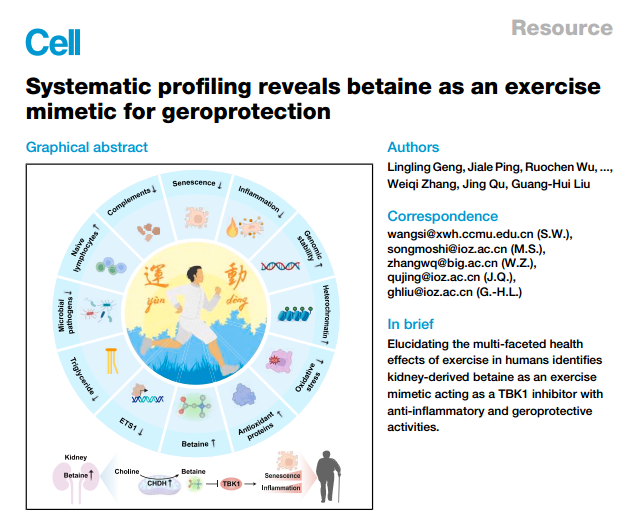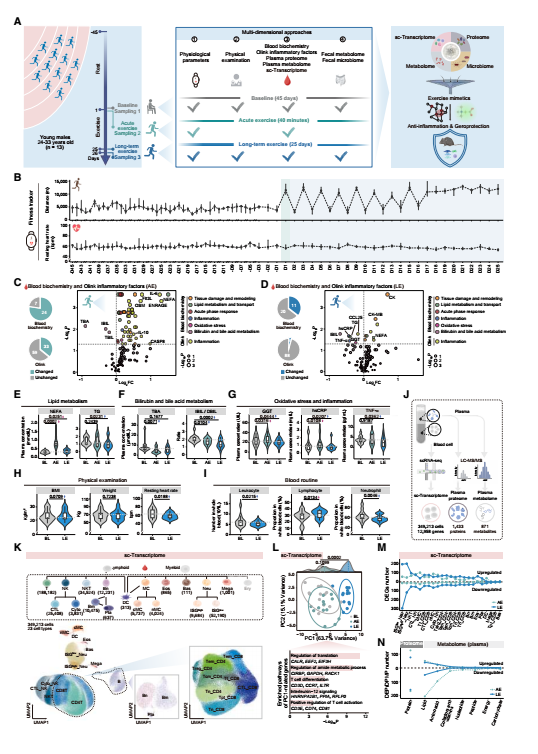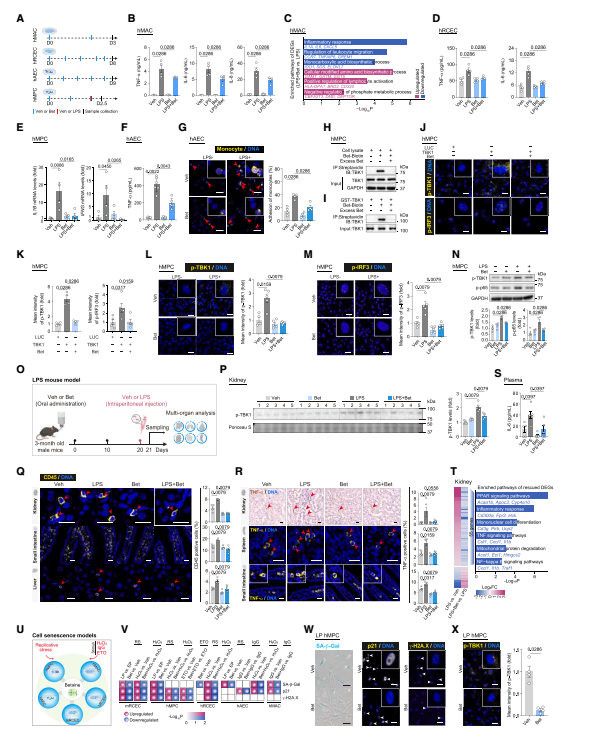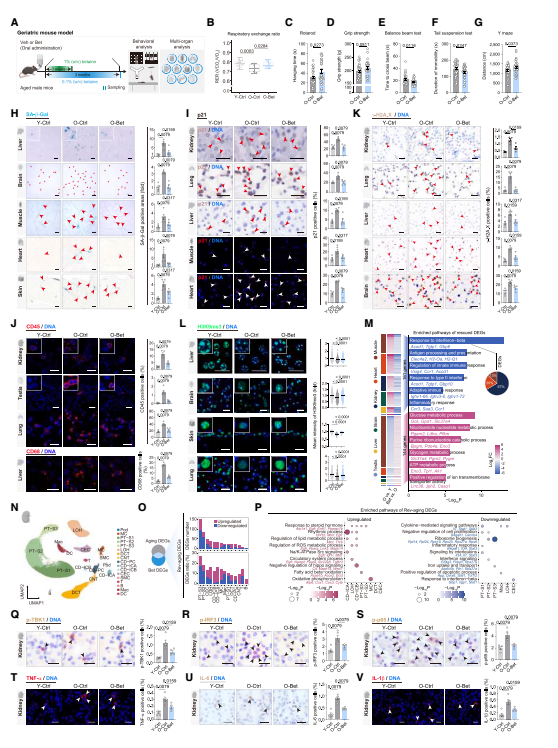Exercise is known to delay aging and improve metabolism, but what's the molecular mechanism behind it?
A groundbreaking study published in Cell—Systematic profiling reveals betaine as an exercise mimetic for geroprotection—decodes the anti-aging secrets of exercise using single-cell sequencing, plasma proteomics/metabolomics, and gut microbiome analysis. The key finding: Betaine (produced by kidneys) acts as an "exercise substitute," delivering health benefits without physical exertion!

I. How Does Betaine Become an "Exercise Mimetic"?
1. Exercise Reshapes Metabolism, with Betaine as the Key Mediator
■Acute exercise (e.g., a single 5-km run) triggers transient inflammation.
■Long-term exercise (25 days of regular running) significantly elevates plasma betaine levels, with concentrations positively correlated with exercise duration.
■Kidneys are betaine’s "production hub": Exercise activates choline dehydrogenase (CHDH) in kidneys, converting choline to betaine, which then circulates systemically.

Figure 1. Systematic analysis of acute vs. long-term exercise effects
2. Betaine’s Multi-Pronged Anti-Aging Mechanism
■Inhibits the aging driver TBK1: Betaine directly binds TBK1 kinase, blocking its downstream inflammatory signals (e.g., NF-κB pathway) and reducing senescent cell accumulation.

Figure 2. Betaine inhibits TBK1 activity, attenuating senescence and inflammation
■Repairs cellular "aging markers": Reduces DNA damage marker γ-H2A.X and senescence protein p21 while enhancing heterochromatin stability (H3K9me3).
■Whole-body anti-aging evidence: Aged mice supplemented with betaine showed improved kidney function, enhanced muscle strength, better cognition, and reduced age-related pathology in liver/kidneys.

Figure 3. Betaine administration delays systemic aging in mice
II. Key Conclusions
1. Exercise remodels metabolism via betaine
■Long-term exercise elevates plasma betaine through renal CHDH activation (acute exercise lacks this effect).
■Betaine concentration correlates positively with exercise duration.
2. Betaine delays aging by inhibiting TBK1
■Directly binds TBK1, suppressing NF-κB/IRF3 inflammatory signaling.
■Reduces senescence markers (p21, γ-H2A.X) and boosts antioxidant capacity (NRF2 activation).
3. Betaine mimics exercise’s anti-aging benefits
■Supplementation in aged mice reverses multi-organ aging phenotypes (inflammation/fibrosis/cellular senescence) and improves metabolic/functional capacity, mirroring long-term exercise effects.
III. Implications: Anti-Aging Without Exercise? A Promising Future!
■"Lazy bonus": Betaine could be developed into oral supplements to simulate exercise-derived metabolic/immune benefits, especially for mobility-limited individuals.
■New aging intervention target: Identifies TBK1 kinase as a key target for age-related diseases (e.g., Alzheimer’s, cardiovascular disorders).
Reference
Geng, Lingling et al. "Systematic profiling reveals betaine as an exercise mimetic for geroprotection." Cell, S0092-8674(25)00635-X. 25 Jun. 2025, doi:10.1016/j.cell.2025.06.001
AntibodySystem Product Support
|
Target |
Catalog No. |
Product name |
|
TBK1 |
YHJ75801 |
Recombinant Human TBK1 Protein, N-His |
|
RHJ75803 |
Anti-Phospho-NAK/TBK1 (S172) Antibody (R2K75) |
|
|
RHJ75802 |
Anti-TBK1 Antibody (R2K76) |
|
|
RHJ75801 |
Anti-TBK1 Antibody (R2K77) |
|
|
PHJ75801 |
Anti-TBK1 Polyclonal Antibody |
|
|
BHMT |
PHE65401 |
Anti-ALDH7A1 Polyclonal Antibody |
|
PHJ97901 |
Anti-BHMT Polyclonal Antibody |
|
|
PHK02301 |
Anti-BHMT2 Polyclonal Antibody |
|
|
RHE65402 |
Anti-ALDH7A1 Antibody (R1X38) |
|
|
RHE65401 |
Anti-ALDH7A1 Antibody (R1X39) |
|
|
RHJ97901 |
Anti-BHMT Antibody (R3Y25) |
